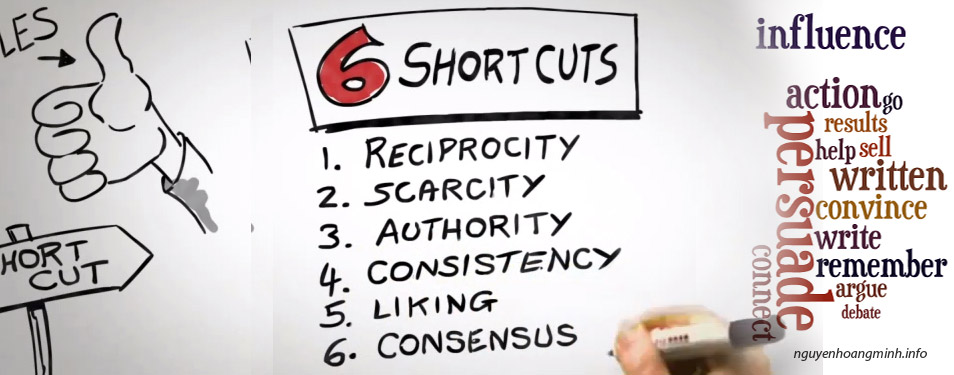A lucky few have it; most of us do not. A handful of gifted “naturals” simply know how to capture an audience, sway the undecided, and convert the opposition. Watching these masters of persuasion work their magic is at once impressive and frustrating. What’s impressive is not just the easy way they use charisma and eloquence to convince others to do as they ask. It’s also how eager those others are to do what’s requested of them, as if the persuasion itself were a favor they couldn’t wait to repay.

The frustrating part of the experience is that these born persuaders are often unable to account for their remarkable skill or pass it on to others. Their way with people is an art, and artists as a rule are far better at doing than at explaining. Most of them can’t offer much help to those of us who possess no more than the ordinary quotient of charisma and eloquence but who still have to wrestle with leadership’s fundamental challenge: getting things done through others. That challenge is painfully familiar to corporate executives, who every day have to figure out how to motivate and direct a highly individualistic work force. Playing the “Because I’m the boss” card is out. Even if it weren’t demeaning and demoralizing for all concerned, it would be out of place in a world where cross-functional teams, joint ventures, and intercompany partnerships have blurred the lines of authority. In such an environment, persuasion skills exert far greater influence over others’ behavior than formal power structures do.
Which brings us back to where we started. Persuasion skills may be more necessary than ever, but how can executives acquire them if the most talented practitioners can’t pass them along? By looking to science. For the past five decades, behavioral scientists have conducted experiments that shed considerable light on the way certain interactions lead people to concede, comply, or change. This research shows that persuasion works by appealing to a limited set of deeply rooted human drives and needs, and it does so in predictable ways. Persuasion, in other words, is governed by basic principles that can be taught, learned, and applied. By mastering these principles, executives can bring scientific rigor to the business of securing consensus, cutting deals, and winning concessions. In the pages that follow, I describe six fundamental principles of persuasion and suggest a few ways that executives can apply them in their own organizations.
The Principle of Liking:
People like those who like them.
The Application:
Uncover real similarities and offer genuine praise.
The retailing phenomenon known as the Tupperware party is a vivid illustration of this principle in action. The demonstration party for Tupperware products is hosted by an individual, almost always a woman, who invites to her home an array of friends, neighbors, and relatives. The guests’ affection for their hostess predisposes them to buy from her, a dynamic that was confirmed by a 1990 study of purchase decisions made at demonstration parties. The researchers, Jonathan Frenzen and Harry Davis, writing in the Journal of Consumer Research, found that the guests’ fondness for their hostess weighed twice as heavily in their purchase decisions as their regard for the products they bought. So when guests at a Tupperware party buy something, they aren’t just buying to please themselves. They’re buying to please their hostess as well.
What’s true at Tupperware parties is true for business in general: If you want to influence people, win friends. How? Controlled research has identified several factors that reliably increase liking, but two stand out as especially compelling—similarity and praise. Similarity literally draws people together. In one experiment, reported in a 1968 article in the Journal of Personality, participants stood physically closer to one another after learning that they shared political beliefs and social values. And in a 1963 article in American Behavioral Scientists, researcher F. B. Evans used demographic data from insurance company records to demonstrate that prospects were more willing to purchase a policy from a salesperson who was akin to them in age, religion, politics, or even cigarette-smoking habits.
Managers can use similarities to create bonds with a recent hire, the head of another department, or even a new boss. Informal conversations during the workday create an ideal opportunity to discover at least one common area of enjoyment, be it a hobby, a college basketball team, or reruns ofSeinfeld. The important thing is to establish the bond early because it creates a presumption of goodwill and trustworthiness in every subsequent encounter. It’s much easier to build support for a new project when the people you’re trying to persuade are already inclined in your favor.
Praise, the other reliable generator of affection, both charms and disarms. Sometimes the praise doesn’t even have to be merited. Researchers at the University of North Carolina writing in theJournal of Experimental Social Psychology found that men felt the greatest regard for an individual who flattered them unstintingly even if the comments were untrue. And in their book Interpersonal Attraction (Addison-Wesley, 1978), Ellen Berscheid and Elaine Hatfield Walster presented experimental data showing that positive remarks about another person’s traits, attitude, or performance reliably generates liking in return, as well as willing compliance with the wishes of the person offering the praise.
Along with cultivating a fruitful relationship, adroit managers can also use praise to repair one that’s damaged or unproductive. Imagine you’re the manager of a good-sized unit within your organization. Your work frequently brings you into contact with another manager—call him Dan—whom you have come to dislike. No matter how much you do for him, it’s not enough. Worse, he never seems to believe that you’re doing the best you can for him. Resenting his attitude and his obvious lack of trust in your abilities and in your good faith, you don’t spend as much time with him as you know you should; in consequence, the performance of both his unit and yours is deteriorating.
